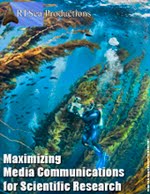 Was perusing through two articles on coral reefs that addressed the same basic issue - coral health - and had an interesting connection.
Was perusing through two articles on coral reefs that addressed the same basic issue - coral health - and had an interesting connection.First, for those of you who are not familiar with the coral-zooxanthella relationship, within the tissues of coral are forms of algae, zooxanthellae, that provide much of the coral's color. This algae exists in a symbiotic relationship with the coral: basically, the coral generates wastes and nitrogen which the algae feed on and, in return, the algae produces nutrient sugars that the corals require.
Healthy coral exists only within very specific parameters and when environmental conditions are not ideal, as with an increase in water temperature, the algae disappears and the overall health of the coral is weakened, a condition called "coral bleaching" which can often prove fatal for the coral. Coral bleaching can be a naturally occurring event, like lightning-induced forest fires, which nature can withstand or handle. But climate change has been cited as a leading cause of an alarming increase in coral bleaching events worldwide.
 A study published in Ecological Applications (Vol. 19[6]), detailed how better coral reef management which would produce clearer and cleaner water can help improve the coral's ability to withstand the effects of temperature change, thereby better resisting coral bleaching events. The article, Improved water quality can ameliorate effects of climate change on corals, cited coral's inability to genetically adapt or to alter the coral-zooxanthella relationship to better resist changes in temperature. The study reviewed data from coral bleaching events occurring in Australia's Great Barrier Reef during 1998 and 2002, examining relationships between heat stress and nutrient flux (what's in the water). Areas of poorer water quality played a significant role in the severity of the coral bleaching event.
A study published in Ecological Applications (Vol. 19[6]), detailed how better coral reef management which would produce clearer and cleaner water can help improve the coral's ability to withstand the effects of temperature change, thereby better resisting coral bleaching events. The article, Improved water quality can ameliorate effects of climate change on corals, cited coral's inability to genetically adapt or to alter the coral-zooxanthella relationship to better resist changes in temperature. The study reviewed data from coral bleaching events occurring in Australia's Great Barrier Reef during 1998 and 2002, examining relationships between heat stress and nutrient flux (what's in the water). Areas of poorer water quality played a significant role in the severity of the coral bleaching event.So, what kind of factors can impact the water quality surrounding coral reefs and how can coral reef management be of help?
 Another study, published in Environmental Pollution (Vol. 157[8-9]), also examined the Great Barrier Reef - this time focusing on pollution, specifically herbicides which, along with insecticides and fungicides, make their way into the coral reef ecosystem as runoff from agricultural areas through rivers and creeks. According to the article, Herbicides: A new threat to the Great Barrier Reef, even at low trace levels, these pollutants can impact the overall health of the corals, thereby reducing their ability to withstand any other adverse changes to the environment, such as temperature change, and making them more susceptible to coral bleaching.
Another study, published in Environmental Pollution (Vol. 157[8-9]), also examined the Great Barrier Reef - this time focusing on pollution, specifically herbicides which, along with insecticides and fungicides, make their way into the coral reef ecosystem as runoff from agricultural areas through rivers and creeks. According to the article, Herbicides: A new threat to the Great Barrier Reef, even at low trace levels, these pollutants can impact the overall health of the corals, thereby reducing their ability to withstand any other adverse changes to the environment, such as temperature change, and making them more susceptible to coral bleaching.Proper coral management must be a far-reaching holistic approach encompassing activities, such as agricultural development in developing countries, that can contribute to a compromised marine ecosystem already beset with worldwide issues like climate change. Healthy coral reefs provide home and food for a variety of sealife, a natural barrier to protect island communities from weather-inspired wave action and, at the very least, serve as a barometer for the overall health of the oceans.
To learn more about coral reef conservation:
- The Nature Conservancy's coral reef program
- Oceana PSA on coral reefs and bottom-trawling
- Reef Check's coral monitoring program
- Coral Reef Alliance's web site
- NOAA's coral reef conservation program

















No comments:
Post a Comment